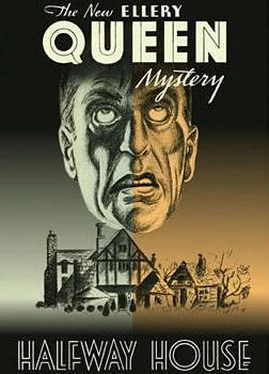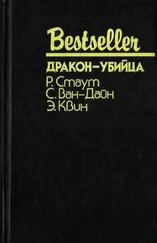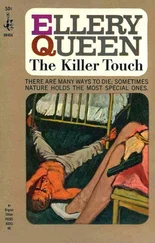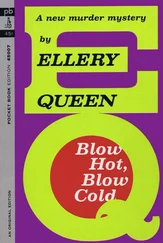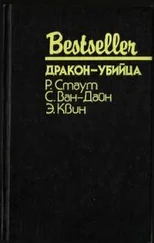“Wait a minute,” said Ellery; he vanished into the bedroom. When he came back he was thoughtfully hefting a.38 police revolver. “You might pack this piece of hardware. It’s loaded; don’t monkey with that safety. You know how to use a gun, of course?”
“I’ve handled ’em.” Bill took it grimly.
“Lord, Andrea, don’t look so apprehensive! This is just an extra safety measure. Now, off with you both. Take good care of her, Bill.”
“We may have some trouble with Andrea’s people,” grinned Bill, waving the revolver. “Is that why you’ve given me this?”
“You might,” said Ellery gravely, “use it on Fish-Face.”
Bill seized Andrea’s arm, still grinning, and hustled the bewildered girl out of the apartment. Ellery walked quickly to the window. He stood motionless until he saw Bill and Andrea running down the stone steps below, Bill’s left hand gripping Andrea’s arm and his right jammed into his pocket. They jumped into the town-car and were gone. The nondescript car parked down the street rolled off at once. Eyes gleaming, Ellery sprang for the telephone in the bedroom and called the Long Distance operator. While he waited his lips were screwed up in a most extraordinary expression. “Hello, De Jong... De Jong? This is Ellery Queen calling. Yes, from New York... Fine, thanks. I say, De Jong, what happened to the evidence in that Wilson case?”
“Cripes, you still harping on that?” growled De Jong. “What evidence?”
“Well, specifically, that chipped plate I saw you stow away the night of the murder. The plate with all those match-stubs on it.”
“Oh, that’s on file down here.” A note of curiosity crept into the Trenton policeman’s voice. “Why?”
“For excellent reasons immaterial at the moment. De Jong, do something for me. Dig out that plate with its contents and—” Ellery paused — “ count the match-stubs .”
“What?” He could almost see De Jong blinking. “You spoofing?”
“Never more serious in my life. Count the stubs. And call me back. I’ll be waiting.” He gave his number. De Jong grunted and hung up. While he waited Ellery paced again with lean and hungry strides. At last the telephone rang.
“Well?” he snapped.
“Twenty.”
“Twenty,” said Ellery slowly. “Well, well, what do you think of that? Thanks, De Jong. Thanks ever so much.”
“But what the hell is the idea? Count the matches! I don’t—”
Ellery smiled vaguely, murmured something, and hung up. He stood still for a moment, musing. Then he threw himself on the bed. After a while he got up to fish a cigaret out of his coat-pocket. While he smoked he examined his face absently in the mirror over his bureau. Then he went back to the bed again. Finally he flung his butt into an ashtray and went into the living-room. Djuna was clearing away the breakfast dishes, his dark gypsy face scowling at the cup Andrea had used.
He looked up briefly. “That his girl,” he demanded, “that girl?”
“Eh? Oh, I shouldn’t wonder.”
Djuna looked relieved. “I guess she’s all right,” he said. “Pretty keen.”
Ellery went to the window and clasped his hands behind his back. “Djuna, you always were a mathematics shark. How much is left when you subtract twenty from twenty?”
Djuna looked suspicious. “Any kid knows that. Nothing!”
“No,” said Ellery without turning, “that’s where you’re wrong, my son. When you subtract twenty from twenty, oddly enough you have left... everything . Now isn’t that curious, Djuna?”
Djuna snorted and went on with his work; he knew the uselessness of discussion at times like this. And after a moment Ellery said, with a sort of wonder in his voice, “Everything! Lord, the thing’s as plain as a pikestaff now.”
“Yah!” said Djuna derisively. Ellery went to the big armchair reserved for the Inspector and covered his face with his hands. “A what did you say?” frowned Djuna. But Ellery did not reply. So Djuna shrugged and sailed off to the kitchen with his tray.
“As plain as a pikestaff. Plainer.” Ellery sprang out of the chair suddenly. “Yes, by thunder!” he shouted. And he made for the bedroom and the telephone with the swift determination of a man who sees clearly and grimly that there is work to be done.
IN WHICH AS USUAL
THE READER IS CHALLENGED
“The public,” Thomas De Quincey once wrote, “is a bad guesser.” If hedonistic Tommy was right about the public of his own time, then man in the mass has changed remarkably during the past century. For any fashioner of crime tales these days will tell you that the modern public — at least, that part of the public which seeks its escape in detective fiction — is a very good guesser indeed; much too good, if you ask me. In fact, from the letters hurled at my poor head it would appear that the reader who is fooled is the exception rather than the rule.
But we have a sound defense. Guessing isn’t fair. Although each writer is his own Hoyle in composing the rules of the game, we all manage to agree on that fundamental. Guessing isn’t fair because the number of characters in any detective story is necessarily limited; and somewhere, at some stage of the tale, the reader is bound to suspect in his turn the character who ultimately is unmasked as the author of all the villainy.
For many years I have been a voice crying in the wilderness — I trust not vainly — beseeching readers to repress heroically their guessing proclivities and play the game scientifically. It’s harder, but immeasurably more fun.
Why not begin with the problem of Joseph Kent Gimball’s murder?
At this point in the story you are in possession of all the facts needed to build up a complete and logical solution of the crime. Your job is to spot the vital clues, assemble them in rational order, and from them deduce the one and only possible criminal. It can be done; it has been done, as you will see.
If you fail, of course, you can always fall back on the old reliable guesswork. If you succeed, let me know about it. As a matter of fact, that’s hardly a necessary admonition. If you succeed, I will know about it. And, as Inspector Queen likes to point out, how!
ELLERY QUEEN
“While we are examining into everything
we sometimes find truth
where we least expected it.”
Until the day Andrea related her curious little story of the half dozen match-stubs, the riddle of Joseph Kent Gimball’s death remained in a state of suspension, fixed there by the dark hands of fate. But when the story was told, animation superseded suspension, mystery became knowledge, suspicion turned into certainty. The case was snatched out of those dark hands by Mr. Ellery Queen, who directed its destiny thereafter with all the carefulness and cunning which years of experience as a diagnostician of crime had taught him.
Ellery was monstrously busy for days after the event. Whatever he was conniving, he meant it to be secret from most; his two hurried trips to Trenton were surreptitious, and no one knew of his dozens of telephone calls except those persons to whom they were addressed. He conferred privately with various hard-looking individuals; he sought the professional advice of Sergeant Velie; and, if the truth had been known, arranged a certain matter of unsuspected and illegal entry with a bland disregard of the civil rights of a free citizenry which would have made his father, the Inspector, shudder.
Then, his plans made, he came out into the open.
He began hostilities, strangely enough, on a Saturday. Whether this was a whim of chance of cynical design Ellery never explained, but the mere fact served to heighten the tension. The persons concerned could not help but recall the bloody events of that other Saturday when Gimball felt the cold bite of metal in his heart; the memory was clearly reflected by their strained faces.
Читать дальше
